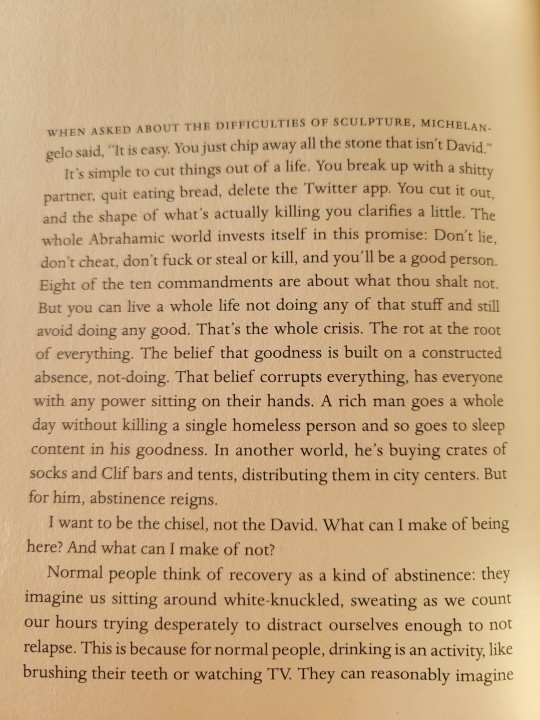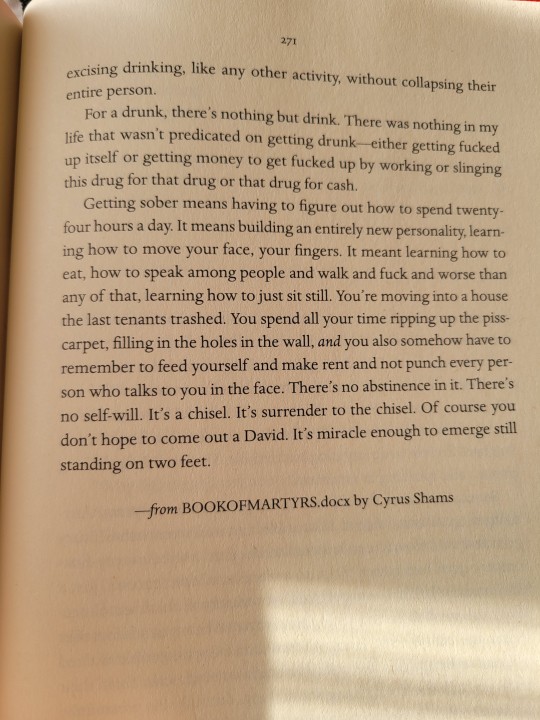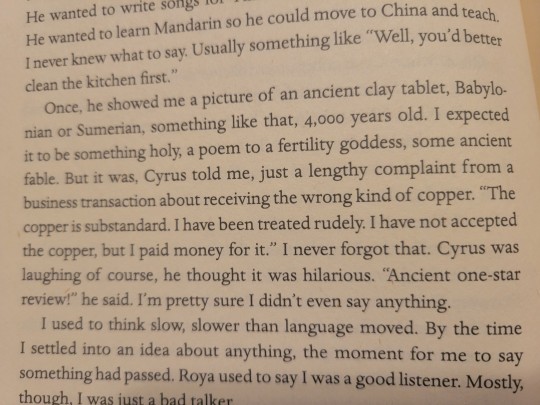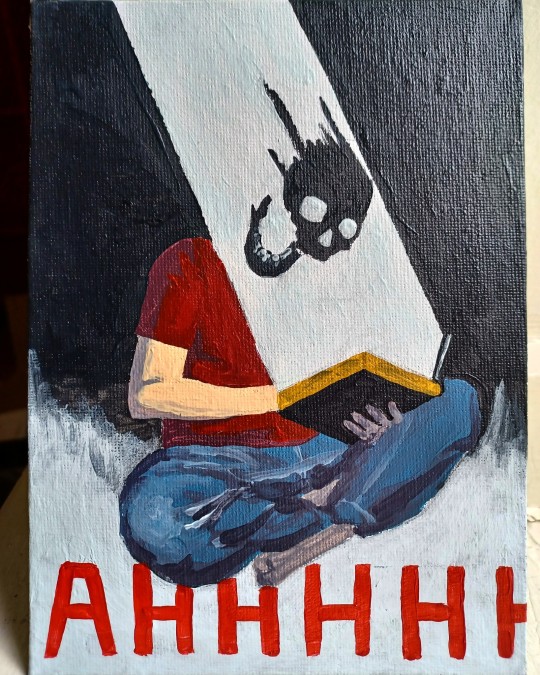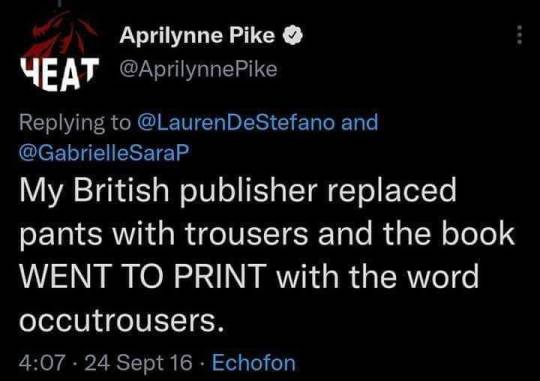Text
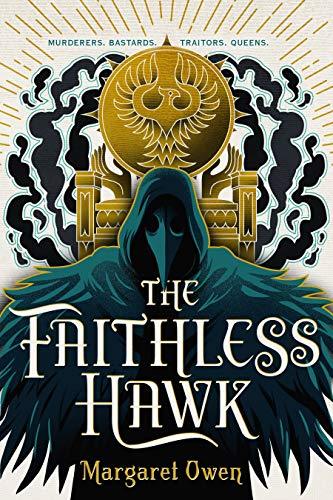
The Faithless Hawk. By Margaret Owen. Henry Holt and Company, 2020.
Rating: 3/5 stars
Genre: YA fantasy
Series: The Merciful Crow #2
Summary: As the new chieftain of the Crows, Fie knows better than to expect a royal to keep his word. Still she’s hopeful that Prince Jasimir will fulfill his oath to protect her fellow Crows. But then black smoke fills the sky, signaling the death of King Surimir and the beginning of Queen Rhusana's merciless bid for the throne.
With the witch queen using the deadly plague to unite the nation of Sabor against Crows—and add numbers to her monstrous army—Fie and her band are forced to go into hiding, leaving the country to be ravaged by the plague. However, they’re all running out of time before the Crows starve in exile and Sabor is lost forever.
A desperate Fie calls on old allies to help take Rhusana down from within her own walls. But inside the royal palace, the only difference between a conqueror and a thief is an army. To survive, Fie must unravel not only Rhusana’s plot, but ancient secrets of the Crows—secrets that could save her people, or set the world ablaze.
***Full review below.***
CONTENT WARNINGS: violence, blood, disturbing imagery
OVERVIEW: I quite enjoyed the first book in this duology, so I decided to keep going and read book 2. I enjoyed this reading experience as well, though I must admit it was somewhat lessened due to the focus on plot over character interactions. Still, there were some aspects that I thought were improved from the first book. All in all, I'm rating this 3 stars because I'm still a bit mixed, though leaning in favor.
WRITING: Owen's prose is about the same as in book 1, so I don't have much to add. Owen balances showing and telling well, and I think the sentences flow well and are clearly written.
PLOT: The plot of this book follows Fie as she attempts to stop Queen Rhusana from seizing the throne of Sabor. Since book 1, Fir has gained an armed guard for protection, but their loyalties are called into question when the King dies and the Queen has yet to be granted formal authority over the military. Moreover, Jasimir and Tavin are put to the test when Rhusana offers them a deal - one that challenges the royals' oath to keep the Crows safe by leveraging the stability of the kingdom.
There were a couple things about this plot that I think improved upon the shortcomings of the first book. For one, Rhusana has more of a presence and seems to be actively involved in events (rather than being a boogeyman in the background). I still think she has a tendency to conveniently pop up when the plot needs some action, but I liked that she was more of a direct threat this time around.
I also appreciated that Owen wrote more about the Sinner's Plague. In this book, Rhusana manipulates the people into thinking that Crows are not needed to stop the plague, which puts whole towns at risk. In book 1, the plague seemed like a vague background detail, but this time, it posed more of a problem.
But even with these things, I found that I didn't enjoy the story as much as the first book, and I think it's because there's less focus on character growth. In book 1, there's the roadtrip plot, but characters learn and grow at the same time. In this book, character relationships are already established and Owen doesn't devote time to building up a partnership between Fie and her new allies, Khoda and Viimo.
I also wasn't a huge fan of the fact that Fiw was so quick to assume the worst of Tavin when he makes a questionable decision. Fie spends her time feeling hurt and betrayed, and while that's valid, it didn't seem plausible that she would assume Tavin had a complete change of heart. I think a little more nuance in the way this aspect is handled would have made the angst less anoying.
Lastly, the nuanced exploration of prejudice in book 1 was absent in book 2, and while I don't think Owen needed to rehash her previous points, I was disappointed that book 2 didn't take the opportunity to look at how prejudice and power work (or something). I was hoping that book 2 would continue the discussion from book 1, or build on the main concept, but most of what I thought made book 1 special was absent in book 2.
TL;DR: The Faithless Hawk takes readers back to the rich world of Sabor, but I personally found it less enjoyable than book 1. Though it does make some improvements re: the sinner's plague and the antagonist, there isn't a lot of development for the characters and more focus is given to the political plot than the personal relationships or contemplation of prejudice.
CHARACTERS: Fie, Jasimir, and Tavin are protagonists once more in this book. Fie is still admirable but, in my opinion, a little more impulsive and quick to judge. She also has a secret identity which was fine but kind of took away from what I liked about her in book 1. Tavin was fine but made some stupid decisions that had me roll my eyes. Jasimir was fine - not much to him this time around.
We did have some new characters that were interesting. Khoda was fun, but he seemed to be there mostly to make plans and fill Fie in on needed info. I wish more had been done to develop his personal relationship with Fie (as an ally) and Jasimir (as his subject and lover).
Rhusana was more present in this book and thus became a more threatening protagonist. There were times when I thought her schemes and plans were silly and didn't make much sense (other than to cause drama), and I wish Owen had put more pressure on her desire to replace the caste system with a new hierarchy with her at the top. I think this plan would have made for some interesting commentary on power and would have complimented the first book well.
1 note
·
View note
Text
"the problem with booktok is that it romanticizes toxic relationships blah blah blah" NO!! the problem with booktok is that its a community that talks about, produces, and consumes published novels the same way people talk about, produce, and consume fanfiction. every issue with booktok (lowbrow subject matter, oftentimes poor writing and editing, a disproportionately heavy focus on erotica, books described via tropes (tags) instead of plot synopses, thinly-veiled misogyny) boils down to that. i don't give a single solitary shit if colleen hoover is writing toxic step-sibling incest romance! i've come across weirder shit this week on ao3!! what i do care about is the fact it reads exactly like an unbetaed oc-centric slash fic and this woman is expecting us to pay upwards of $20 for a copy!! girl i can read mid-tier fic for free any time i want i don't need you!!
5K notes
·
View notes
Text
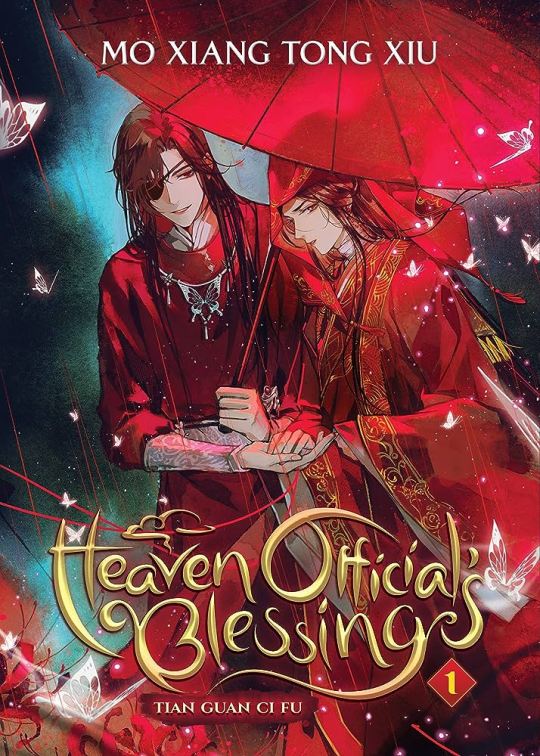
Heaven Official's Blessing: Tian Guan Ci Fu, Vol. 1. By Mo Xiang Tong Xiu (trans. Suika and Pengie). Seven Seas Entertainment, 2021.
Rating: 2/5 stars
Genre: historical fantasy
Series: Heaven Official's Blessing Vol. 1
Summary: Born the crown prince of a prosperous kingdom, Xie Lian was renowned for his beauty, strength, and purity. His years of dedicated study and noble deeds allowed him to ascend to godhood. But those who rise may also fall, and fall he does--cast from the heavens and banished to the world below.
Eight hundred years after his mortal life, Xie Lian has ascended to godhood for the third time, angering most of the gods in the process. To repay his debts, he is sent to the Mortal Realm to hunt down violent ghosts and troublemaking spirits who prey on the living. Along his travels, he meets the fascinating and brilliant San Lang, a young man with whom he feels an instant connection. Yet San Lang is clearly more than he appears... What mysteries lie behind that carefree smile?
***Full review below.***
CONTENT WARNINGS: violence, blood, disturbing imagery, references to self-harm and suicide
OVERVIEW: This book was my book club's pick for April 2024. I likely wouldn't have encountered it otherwise, so I was glad for the opportunity to read something outside my usual genres. Overall, I had high hopes, but quickly found this translation to be tedious and borderline unreadable. I have to assume that the original reads different to an audience more familiar with Chinese culture and media, but as a newcomer, I struggled to enjoy the prose and the pacing of the story. Even though I enjoyed some of the imagery and was interested in the overall concept, the style (at least as it is rendered in English) as well as the misogyny was off-putting, so I can only rate this book 2 stars.
WRITING: I can't evaluate the quality of the original because I neither speak nor read Mandarin; I can't say with any credibility whether the translation is accurate, nor am I familiar enough with Chinese literature and media to make any sort of commentary that takes into account its cultural situatedness. Therefore, I can only provide my opinion as an outsider (white native English speaker) coming in cold.
One thing I appreciated about this edition was the supplementary material. There is a pronunciation guide, glossary, and name guide at the back of the book, and I felt like I could grasp the nuances of the story better while consulting these materials. Not only did they help me keep track of names, but they explained the significance of certain characters, genre influences, and other cultural touchstones that would otherwise be invisible to me, so I am grateful to the editors for including so much support.
All that being said, I struggled with the style and tone of the prose within the body of the text itself. I'm sure these things come across differently in the original Mandarin, but in English, the writing feels somewhat haphazard. Some parts feel like they take on an almost mythic tenor, mimicking a style that I associate with fairy tales or epics. But then the tone will shift to something more emotional or humorous, using punctuation in a way I (as an English speaker) associate with a younger audience (multiple exclamation points, ellipses, swearing, etc.). There is also a lot more telling than showing and very little to help the reader connect with the interiority of the characters. It felt like I was reading the draft of a story written by a new writer. Again, I'm sure the original Mandarin comes across differently, but for me, the style rendered in English was difficult to enjoy.
PLOT: The plot of this book follows Xie Lian, a prince who has ascended to godhood but falls on account of some poor decisions. He eventually manages to ascend and fall and ascend again, but to smooth things over with the other gods, he is tasked with returning to the mortal world to battle ghosts and other vengeful spirits. Along the way, he meets a mysterious boy named San Lang, who may or may not be a supernatural being himself.
I really enjoyed the creepy imagery in this story as well as the interactions between Xie Lian and San Lang. I generally enjoy horror and supernatural storytelling, so the descriptions of the ghosts were incredibly creative and resonant, and I loved the lore that accompanied them. I also thought the interactions between Xie Lian and San Lang were sweet, and I relished the suspense that told us there was more to San Lang than meets the eye.
But despite these things, I struggled to be invested in the larger story because of the writing style. In English, this book relies a lot on telling over showing, which means there's not a lot the reader can bring to the table. The progression of the narrarive also feels a bit random, with scenes not necessarily building on one another and twists happening without much groundwork. The action is also more focused on character bickering and explaining backstory than it is on what's actually happening. I can see how this book would make for a compelling tv show; it's fairly episodic in nature, so it would work well in a visual medium. But as a novel (especially in English), it was difficult to get through.
As a final note: the way female characters were treated in this book was off-putting. It was definitely not the worst I've seen - there's no sexual violence or anything. But there are so few women that when they do appear, their treatment is all the more apparent and unsettling, from Xie Lian remarking upon a character's ugliness as she lays dying to a female ghost who is driven mad by her obsession with a male love interest.
CHARACTERS: In general, I found the characters themselves interesting in that they had unique abilities and motivations, but I also struggled to connect to them because of the prose style and lack of strong motivations.
Xie Lian, the protagonist, is likable in that he is brave and seems to be compassionate. His status as a "weirdo" amongst the gods sets him apart and makes him more compelling, and I thought his ability to control the supernatural silk strip Ruoye was fun. However, we're not really given a strong motivation for Xie Lian wanting to be a god or wanting to fit in, so a lot of his arc felt like he was just going around doing cool things for the sake of being cool. Of course, there are more volumes in this novel series, so there is still time for Xie Lian to grow and change, but in this volume, I wasn't sure what we were meant to see in the protagonist other than a person with neat abilities. Most of what makes him a misfit happen off-page, and he seems rather competent in his adventures on-page, so it felt like we were being asked to accept that he is an outsider with bad luck without being shown those things.
San Lang, the youth who befriends Xie Lian, is fun to watch, in part because the reader knows he's hiding something. I liked watching his carefree and playful attitude brush up against awkward moments when it was clear San Lang wasn't human, and I found it endearing how much he cared for Xie Lian. Because readers might know who he really is, his character was even more intriguing because his motivations seemed at odds with what everyone knew about him. This made me want to read more and uncover why he was acting in such and such a way.
Side characters were fine. I don't think they needed to be as developed as the protagonists, and I don't really have much to say about them.
TL;DR: While I can see the appeal of Heaven Official's Blessing and think it would make for a great TV show, the style of the English translation is difficult to get through. I enjoyed a lot of the imagery and the interactions between the two protagonists, but the progression of the plot left a lot to be desired.
1 note
·
View note
Text

The Warm Hands of Ghosts. By Katherine Arden. Del Rey, 2024.
Rating: 3/5 stars
Genre: historical fiction, supernatural
Series: N/A
Summary: January 1918. Laura Iven was a revered field nurse until she was wounded and discharged from the medical corps, leaving behind a brother still fighting in Flanders. Now home in Halifax, Canada, she receives word of Freddie’s death in combat, along with his personal effects—but something doesn’t make sense. Determined to uncover the truth, Laura returns to Belgium as a volunteer at a private hospital. Soon after arriving, she hears whispers about haunted trenches, and a strange hotelier whose wine gives soldiers the gift of oblivion. Could Freddie have escaped the battlefield, only to fall prey to something—or someone—else?
November 1917. Freddie Iven awakens after an explosion to find himself trapped in an overturned pillbox with a wounded enemy soldier, a German by the name of Hans Winter. Against all odds, the two men form an alliance and succeed in clawing their way out. Unable to bear the thought of returning to the killing fields, especially on opposite sides, they take refuge with a mysterious man who seems to have the power to make the hellscape of the trenches disappear.
As shells rain down on Flanders, and ghosts move among those yet living, Laura’s and Freddie’s deepest traumas are reawakened. Now they must decide whether their world is worth salvaging—or better left behind entirely.
***Full review below.***
CONTENT WARNINGS: descriptions of trench warfare and wartime injuries, PTSD
OVERVIEW: I picked up this book on a whim when I saw it displayed at a local bookstore. I generally find myself interested in World War I fiction, so I was hoping I'd get a good story out of this. Unfortunately, I can't say this book had a profound impact on me. While I liked the way Arden explored memory and how she crafted the main antagonist, it was difficult to connect to the protagonists and the plot didn't feel deliberate. As a result, I can only give this book 3 stars.
WRITING: Arden's prose is fairly clean and will probably appeal to most readers. It flows just fine and balances showing and telling well, and it even has some intriguing descriptions and imagery; however, I wouldn't necessarily call it atmospheric or particularly visceral. It's fine - it's just not very lush.
PLOT: The plot of this book is divided into two timelines. In 1918, we follow Laura Iven, a discharged combat nurse who receives her brother's effects but no information about how he died on the front in Belgium. She decides to return to the front to find out what happened to him. In 1917, we follow Freddie Iven, a soldier who finds himself trapped in an overturned pillbox with a German soldier. The two decide to keep each other alive as they make their escape and leave the front, only to encounter a strange man on the way.
The first third of this plot progressed somewhat slowly and unevenly. Part of me didn't enjoy it because it didn't seem like Laura was very driven to find her brother, nor did she really have any whiff that something was amiss. Mostly, we follow Laura as she travels with two other women and attends parties, but I never got the sense that she was calculating her next moves or trying to use her experience to uncover information being withheld from her about her brother. She mostly just accepts that he's gone and decides to try to find out for... fun? I don't know - she didn't seem very driven or obsessive. As a result, I had a hard time caring about her progress.
The next third was a little better since we are introduced to a mysterious figure named Faland. In my opinion, Arden gives the game away too quickly regarding who Faland is, but I enjoyed watching him and figuring out whether he was real or just a story.
The last third was perhaps the most interesting part because we see Laura actually tracking down her brother and Freddie surrendering to oblivion. I liked the way this section depicted trauma and memory as well as how it associated war with hell.
But altogether, I don't think this plot had a huge impact because character relationships felt surface-level. Perhaps if more was done to deepen the connections between characters, I would have felt more invested in their plots. But as it stands, it didn't seem like Laura was particularly preoccupied with finding her brother, nor did the plot make use of suspense to keep the reader on edge.
TL;DR: The Warm Hands of Ghosts is memorable for its antagonist, but the lack of strong character relationships makes this book feel devoid of suspense and urgency. While it does a great job exploring shell-shock and the mental toll of war, it is held back by a protagonist who doesn't seem very driven and a plot that doesn't pick up for quite a while.
CHARACTERS: Laura, the combat nurse, is interesting on paper but is harder to connect to in practice. While I sympathized with her desire to find her brother, I didn't quite feel like their connection was strong and I didn't think she pursued her goals with much zeal (at least until the last third of the book). I think if Arden did a little more work to show us more about her past and her inner life during the first third, I might have felt different.
Freddie, the soldier, is a little more interesting because we see a lot of what affects him. We see him in the trenches and we see his reactions to traumatic events. It's a lot easier to feel invested in his story. However, his devotion to Laura is similarly ill-defined and surface-level, and I didn't feel like I understood why the two fought so hard to get to one another aside from the fact that they were siblings (which isn't much of a reason on its own - siblings can hate each other).
Supporting characters were fine, but I didn't feel like much was done to show me how their relationships with the protagonists became driving forces behind action. By that I mean I feel like I was told more about relationships than shown, so even the most emotional bonds didn't feel very affective.
Faland, the antagonist (sort of), was perhaps the most interesting character, in part because it wasn't clear at first who he was. I liked the creative use of his musical powers and his desire for stories, and I think Arden did a good job crafting him as a commentary on war and shell-shock.
1 note
·
View note
Text
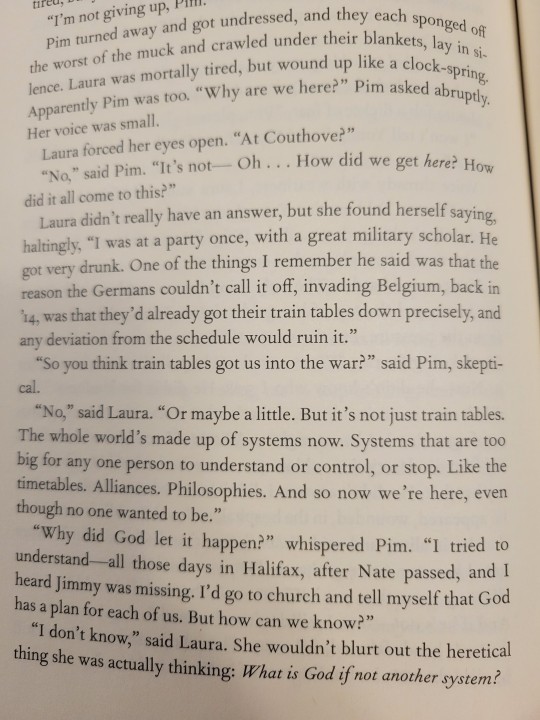
I'm not enjoying this book as much as I want to, but "what is God if not another system" is a banger of a line.
3 notes
·
View notes
Text
"At HarperCollins, a lot of attention and thought is given to deciding exactly what combinations of margin measurements, font, and layout feel most appropriate for the genre, and writing style.
But in a case of do-your-part environmentalism, designers at the publishing house have now standardized a series of subtle and imperceptible alterations to normal font style, layouts, and ink that have so far removed the need for 245 million book pages, totaling 5,618 trees.
Telling the story in Fast Company, representatives from HarperCollins, one of the four largest publishing houses in the world, explained that the idea first arose in Zondervan Bibles, HarperCollins’ Christian publishing division. Being that the Bible is 2,500 pages or sometimes more, saving ink and pages was not just an environmental consideration, but one of production costs.
A new typeface called NIV Comfort Print allowed Zondervan to shave 350 pages off of every Bible, which by 2017 had amounted to 100 million pages, and which, as Fast Company points out, would be four times higher than the Empire State Building if stacked.
The production and design teams then wondered how much they could save if they applied the same concepts to other genres like romance and fiction. Aside from the invention of the eBook, publishing hasn’t changed much in the last 100 years, and the challenge was a totally novel one for the teams—to alter all their preconceived ideas and try and find a font and typeface that resulted in fewer pages without being harder to read.
They eventually standardized 14 different combinations their tests determined were the most environmentally friendly, and which delivered an unchanged reading experience.
But the challenge didn’t stop there. Printed books, one might not know, are printed in large sheets which are then folded into sections of sixteen pages, meaning that Leah Carlson-Stanisic, associate director of design at HarperCollins, has to calculate the savings of space, words, and ultimately pages with the help of her team to fall in multiples of sixteen.
Nevertheless, they have been successful with it so far, and in the recent print run of one popular book, 1 million pages (or a number near 1 million that coincides with the 16 times tables) were saved.
“We want to make sure our big titles, by prominent authors, are using these eco-fonts,” Carlson-Stanisic said. “It adds up a little bit at a time, saving more and more trees.”"
-via Good News Network, April 4, 2024
--
Note: Great! Waiting to see this on the rest of their books and at the other big publishers!
Actually, though, it's worth noting that this may not come quickly to the other large publishers, because Harper Collins almost certainly owns that font - meaning that other publishers would have to pay HarperCollins in order to use it, on an ongoing basis.
More on publishing shit and more realistic solutions here below the cut!
What I'm hoping for and think is more likely is that this will inspire the development of open source eco-friendly fonts, which would be free for anyone to use. That would make it far more likely other publishers would adopt eco-friendly fonts.
I'm also hoping it would inspire other publishers to create similar eco-friendly fonts of their own.
Ideally, there would be a whole new landscape of (hopefully mostly open source) eco-friendly fonts. And/or to see calculations of the eco-friendliness of popular existing fonts, compared to each other.
If we could have a publicly accessible list of calculations for different fonts, including fonts designed to maximize eco-friendliness, I really do think that it would affect which fonts publishers choose to use. Here's why:
Most people in publishing are on the left (notoriously, actually) and really do care about the environment
People in publishing are plenty aware of these issues re: paper and trees, I promise
Shorter books means smaller production costs - and possibly smaller shipping costs as well, over time! So it would save them money too.
Eco-friendly fonts could also be combined with other measures for greater effect, such as bamboo paper (already in use for a lot of projects where page color/quality is more flexible) and thinner paper (aka paper with a lower weight) that uses less trees.
Don't expect books to all move to just one or two different fonts, though. Publishers and typesetters and font designers will innovate to create more options instead, though it will take longer. This is because different books really do use different fonts for various different reasons - one new font to rule them all isn't really a solution here.
"Every book is in the same font" may sound like a "whatever" deal to a lot of people, but as someone who works in publishing - trust me, it would actually make your reading experience worse, even if you could never quite put your finger on why.
318 notes
·
View notes
Text
“Not all writing is cursed, but surely all of it is haunted. Literature is a catacomb of past readers, past writers, past books. Traces of those who are responsible for creation linger among the words on a page; Shakespeare can’t hear us, but we can still hear him (and don’t ghosts wander through those estate houses upon the moors unaware that they’ve died?). […] Of all of the forms of expression that humanity has worked with—painting, music, sculpture—literature is the eeriest. Poetry and fiction are both incantation and conjuration, the spinning of specters and the invoking of ghosts; it is very literally listening to somebody who isn’t there, and might not have been for a long while. All writing is occult, because it’s the creation of something from ether, and magic is simply a way of acknowledging that—a linguistic practice, an attitude, a critical method more than a body of spells. We should be disquieted by literature; we should be unnerved.”
— Ed Simon, from his essay “Who’s There?: Every Story Is a Ghost Story”, published in The Millions, August 18, 2021
1K notes
·
View notes
Text
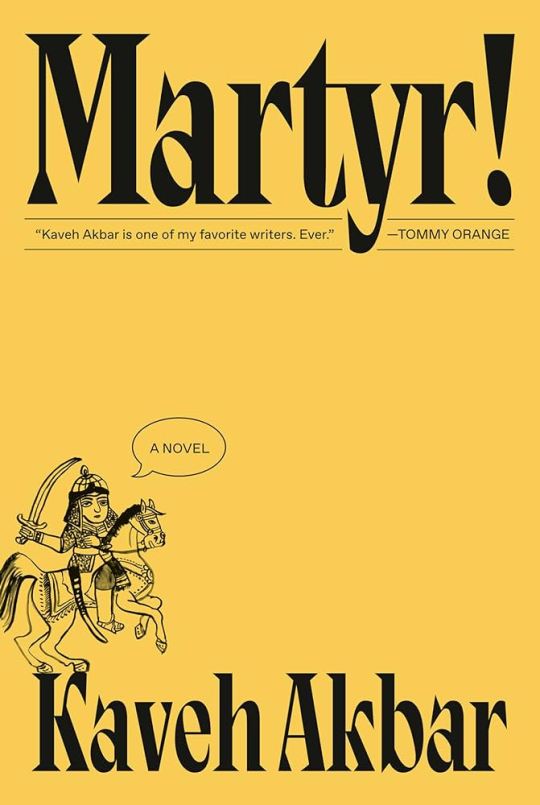
Martyr! By Kaveh Akbar. Alfred A. Knopf, 2024.
Rating: 4/5 stars
Genre: literary fiction
Series: N/A
Summary: Cyrus Shams is a young man grappling with an inheritance of violence and loss: his mother’s plane was shot down over the skies of Tehran in a senseless accident; and his father’s life in America was circumscribed by his work killing chickens at a factory farm in the Midwest. Cyrus is a drunk, an addict, and a poet, whose obsession with martyrs leads him to examine the mysteries of his past—toward an uncle who rode through Iranian battlefields dressed as the Angel of death to inspire and comfort the dying, and toward his mother, through a painting discovered in a Brooklyn art gallery that suggests she may not have been who or what she seemed.
***Full review below.***
CONTENT WARNINGS: drug use, alcoholism, suicidal ideation, blood, bodily injuries, PTSD
OVERVIEW: I didn't know anything about this book or the author before I picked it up; I saw it on a display at my local bookstore, a and it seemed interesting, so I bought it on a whim. Overall, I think this was a beautifully-written novel with a messy protagonist and a meaningful meditation on life, death, and meaning. The only reason why I'm awarding it 4 stars instead of 4.5 or 5 is I think some of it gets a bit too self-referencing for my tastes, some parts a bit too academic. I also think it could have ended more strongly, but the ending isn't necessarily "bad." In sum, the 4 star is subjective; in all, this was a very impressive first novel and I look forward to reading more from this author.
WRITING: I always like reading prose written by a poet and Akbar's prose is no different. It flows beautifully and uses very poignant language, easily calling up evocative metaphor and painting a vivid picture of the characters' lives. There were some especially wonderful passages about addiction and struggling to make life matter, and I felt like every word was put down with intent.
I do, however, have some minor criticisms that are more reflective of my personal taste than anything. For one, there are some moments when Akbar (through his protagonist, Cyrus) says some very blunt things about racism, capitalism, etc. A lot of "-ism" language tends to feel a bit like regurgitating a sociology or critical theory book, which may be fine for some but feels weird to me, personally. Second, there's a recurring image of piss which I just personally found strange. I don't know if Akbar did it on purpose, but every time piss was mentioned, it seemed like a lot for one novel.
PLOT: The plot of this book primarily follows Cyrus Shams, an Iranian-American man approaching 30 who struggles with sobriety. Cyrus is also a writer and aims to write something about death - specifically, he decides to write about martyrdom and people who died "for something bigger than themselves." But when he struggles with the framing of his idea, he decides to consult the artist Orkideh for insight. Orkideh has terminal breast cancer and is spending her last days living in a museum and talking with strangers during her exhibit "Death-Speak," and over the course of a few days, Cyrus learns there might be more to her than he imagined.
The most insightful and moving parts of this book, for me, were when characters spoke about their struggles. I appreciated Cyrus's insights into addiction, his mother (Roya)'s unhappy marriage, his father (Ali)'s life as a single father who must work long hours. All of these passages felt raw and real, enhanced by Akbar's incredible command of language.
I also found Orkideh's project fascinating and I liked the way she responded to Cyrus. Their interactions always felt like she was pushing him to think differently or do better, and I loved watching Cyrus re-examine his own life after every conversation.
If I had any criticism, I would say that I personally thought Cyrus seemed to move from self-absorbed to appreciative in a short span of time, but I alsonrecognize that this book isn't really meant to be a story about one character changing their outlook. It's more like a polyvocalic novel about one particular family - one that contemplates life and death through the lens of war, addiction, illness, etc. The value of these meditations outweigh any personal gripes in have with the pace of character development.
CHARACTERS: Cyrus, our protagonist, is interesting to read because he's at once sympathetic and self-absorbed. I had a lot of compassion for him as an addict who feels adrift in the world, and I found his discussions about identity and wanting to matter compelling. Sometimes his self-centeredness annoyed me, but I think that's on purpose; he's supposed to be fixated on himself because Akbar is, in part, thinking about the self in relation to the world and others.
Orkideh, the artist, is also compelling in that she is putting on this controversial art piece. I enjoyed watching her conversations with Cyrus and I was always curious to hear what she had to say. There was something powerful about her exhibit that I think a lot of people would value if it were real.
There are a number of other characters who have POV chapters scattered throughout the novel - Ali (Cyrus's father), Roya (Cyrus's mother), and Arash (Cyrus's uncle), to name a few. I found their chapters to be moving without distracting from the main narrative. In fact, the subjects they covered complimented Cyrus's arc well.
TL;DR: Martyr! is an impressive and incredibly well-written first novel about wanting one's life (and death) to have meaning. While there are some minor things that didn't suit my personal taste, I was blown away by Akbar's craft and look forward to reading more from the author in the future.
2 notes
·
View notes
Text
"HB 777 not only would fine libraries and librarians, but it would possibly require hard labor by those found guilty. Read that again: librarians would be sentenced to hard labor for daring to join their largest professional organization.
The bill would also potentially kill one of the largest graduate school programs in the state of Louisiana, Louisiana State University’s Masters of Library and Information Science program. Like all Master of Library and Information Science programs, it is accredited by the ALA and goes through a rigorous process to ensure that the curriculum is up-to-date and aligned with best practices in libraries.
Even if the bill is limited “only” to the use of tax money to support membership or attendance/enrollment in ALA-sponsored professional development, take a moment to look into whether or not police, fire, or other public entities are subject to similar legislation in Louisiana or elsewhere. You probably know the answer–and you probably won’t be surprised that one of the few institutional benefits offered to library workers is such membership.
If you haven’t been paying attention until now or you’ve thought these fears when laid out over the last several years were hyperbole and this is your wakeup call, there’s no time like the present to get to work advocating on behalf of your library. If you live in Louisiana, contact your representatives as soon as possible (here’s a very easy way to do that!). You can also reach out to Kellee Dickerson by phone at (225) 380-4232 and email [email protected].
Then, reach out to your own libraries and offer your support, either by showing up at board meetings and/or running for those board positions when vacancies occur. Go borrow books from the library and get your writing hands going with letters to your local papers.
EveryLibrary also has a petition you can sign related to HB777."
Please take the time to sign the petition, spread the word, and support your local library.
3K notes
·
View notes
Text
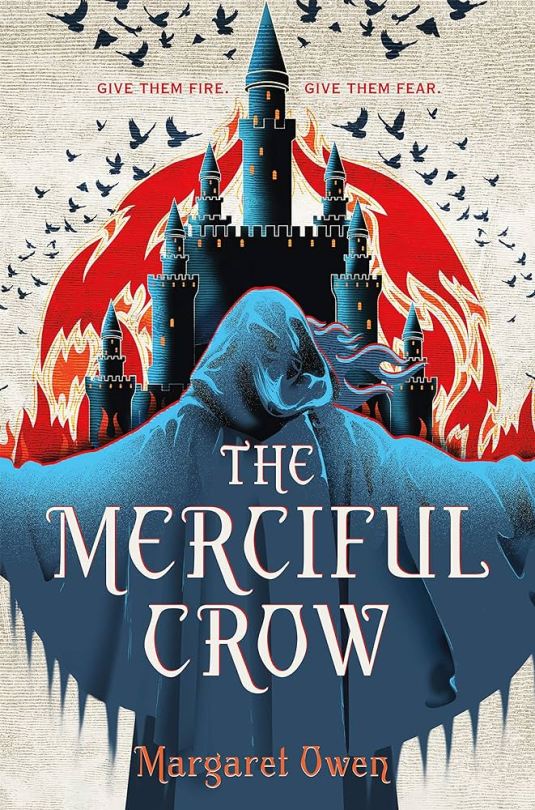
The Merciful Crow. By Margaret Owen. Henry Holt and Company, 2019.
Rating: 4/5 stars
Genre: YA fantasy
Series: Merciful Crow #1
Summary: A future chieftain.
Fie abides by one rule: look after your own. Her Crow caste of undertakers and mercy-killers takes more abuse than coin, but when they’re called to collect royal dead, she’s hoping they’ll find the payout of a lifetime.
A fugitive prince.
When Crown Prince Jasimir turns out to have faked his death, Fie’s ready to cut her losses—and perhaps his throat. But he offers a wager that she can’t refuse: protect him from a ruthless queen, and he’ll protect the Crows when he reigns.
A too-cunning bodyguard.
Hawk warrior Tavin has always put Jas’s life before his, magically assuming the prince’s appearance and shadowing his every step. But what happens when Tavin begins to want something to call his own?
***Full review below.***
CONTENT WARNINGS: depiction of disease, blood, prejudice, violence, mild sexual content
OVERVIEW: This book has been on my TBR pile for a while, and since I'm in the process of clearing out my backlog, it was time to pick it up. Overall, I was surprised by how much I enjoyed this book. I think Owen writes well and has a good sense for pace (which is helpful because I usually don't like plots that are akin to a roadtrip). I also thought the world was interesting, though it did seem to get overcomplex at times. In the end, I gave this book 4 stars and am intrigued enough to read the second book.
WRITING: Owen's prose flows well and gives readers a clear picture of what's going on. I think it balanced showing and telling appropriately, and it moved along at a pace that I found appropriate.
I also think Owen portrayed the multi-faceted nature of prejudice well. In a lot of fantasy, prejudice seems to manifest mostly in the form of insults or violence. In this book, there is some of that, but there is also an effective meditation on things like justice and how Crows have to navigate the world (using separate gates, staying away from certain spaces). The book even brings up language and unconscious bias in ways that felt natural. Overall, I was impressed; rather than feel overfull, the way prejudice was woven into the world felt like a reflection of how its woven into ours.
The main thing I think I can criticize, however, was the worldbuilding. At times, there almost seemed to be too much world and some aspects could have been simplified. There are also some aspects to the world that never seem to be explained or fully made use of; for example, we don't really delve too much into the plague and the concept of sinners though the two structure every part of the Crows' lives. There are also a lot of castes that don't really feel present.
PLOT: The plot of this book follows Fie, a member of the Crow caste who is training to be the next chief of her band. The story begins when Fie's band is called to dispose of the remains of two high-caste plague victims; in this world, only Crows (the lowest caste) are able to touch plague victims and offer them mercy killings, and this makes them both necessary but loathed by the rest of the castes. But when Fie's band discovers that the two victims are alive and have, in fact, faked their deaths, Fie is drawn into a political plot that threatens to put her family and whole caste at risk.
I usually don't like plots where characters are on a roadtrip or being chased, but this story felt well-balanced. Scenes never had just one thing going on; for example, characters would play games or practice fighting with one another and there was always another layer to the interaction (talking about prejudice, verbal sparring, etc). I also liked that the chase wasn't the whole book; most of it occurs in the muddle third while parts one and three deal with other aspects of the plot. As a result, I didn't feel like the story was dragging or that Owen was inventing nonsensical scenes just to extend the time on the run.
I also liked the relationship between Fie and the bodyguard, Tavin. For a while, I was afraid that a romance would develop between Fie and the prince, but Owen went a smarter route and gave Fie more chemistry with Tavin. As a result, there was even more opportunity to talk about how royal castes don't really understand the lives of their subjects and how lived experience bars understanding. I also liked how having to devote one's life to other people became something Fie and Tavin could bond over, and a lot of their conversations felt really productive.
CHARACTERS: Fie, our protagonist, is sympathetic in that she's part of a caste that is despised by the whole of society. I really liked how Fie communicated the necessity of acting in certain ways to avoid trouble and how standing up against injustice could bring more wrath upon her family. It was an honest look at how prejudice works and I could feel Fie's frustration the more the Prince and his bodyguard made demands of her.
Jasimir, the prince, is interesting in part because of his utter lack of knowledge and cluelessness. While he's not incompetent, it's clear that he understands nothing about surviving as a Crow, and while he tries to be kind, there are some things he just hasn't unlearned. He wasn't awful, so I didn't want him to die or anything; he was just a really good example of how lived experience can blind you to the injustice others face.
Tavin, the bodyguard, was compelling due to his efforts to really understand Fie and her life. Tavin messes up plenty of times like Jasimir does, but he makes it a priority to learn from Fie and try to help her in any way he can.
TL;DR: The Merciful Crow is a compelling exploration of prejudice, told through the eyes of someone who is part of an "untouchable" caste. While the worldbuilding got a bit overcomplicated, the character interactions and the way they talked about injustice kept me interested, and I look forward to the second book in this duology.
1 note
·
View note
Text
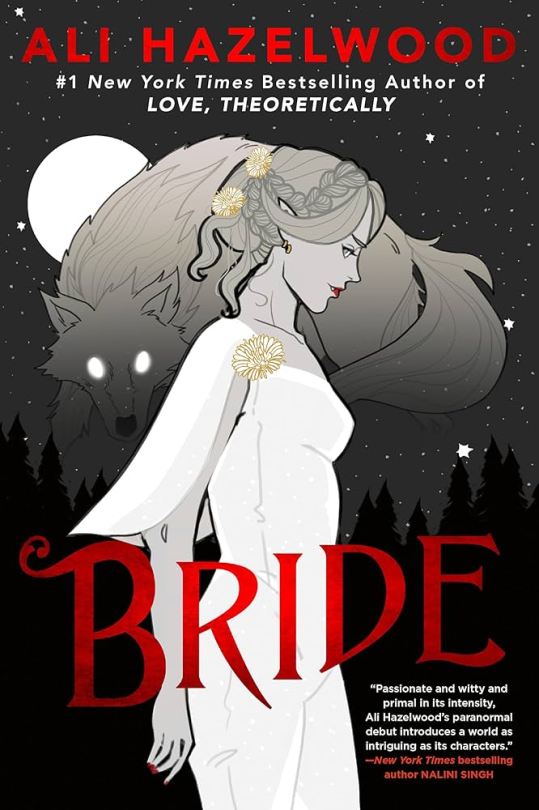
Bride. By Ali Hazelwood. Berkley, 2024.
Rating: 2.5/5 stars
Genre: paranormal romance
Series: N/A
Summary: Misery Lark, the only daughter of the most powerful Vampyre councilman of the Southwest, is an outcast—again. Her days of living in anonymity among the Humans are over: she has been called upon to uphold a historic peacekeeping alliance between the Vampyres and their mortal enemies, the Weres, and she sees little choice but to surrender herself in the exchange—again...
Weres are ruthless and unpredictable, and their Alpha, Lowe Moreland, is no exception. He rules his pack with absolute authority, but not without justice. And, unlike the Vampyre Council, not without feeling. It’s clear from the way he tracks Misery’s every movement that he doesn’t trust her. If only he knew how right he was….
Because Misery has her own reasons to agree to this marriage of convenience, reasons that have nothing to do with politics or alliances, and everything to do with the only thing she's ever cared about. And she is willing to do whatever it takes to get back what’s hers, even if it means a life alone in Were territory…alone with the wolf.
***Full review below.***
CONTENT WARNINGS: explicit sexual content, blood
OVERVIEW: I haven't read an Ali Hazelwood book, but I've seen the author's name around. I was vaguely curious, but contemporary romances aren't my jam; so when I learned that she wrote a paranormal romance, I figured I'd take a chance. Overall, I can see why people might like Hazelwood's work, but personally, I just found this book ok. It was written in a way that will feel dated as tastes change, and it doesn't do anything new or interesting with vampire/werewolf lore. Still, it was a clean manuscript and read quickly, so I think it deserves at least 2.5 stars.
WRITING: Hazelwood's prose is fairly clean in that it's quick, clear, and easy to digest. It's not overly descriptive and it has this light quality that I associate with the romance genre.
I do think, however, that it uses a brand of humor that will become dated after a while. A lot of the humor feels millennial, which isn't necessarily a bad thing, but it was so ubiquitous that I personally found it a little grating at times.
Also (and this is a personal taste thing): this book is written in first person, and I think first person romances are awkward.
PLOT: The non-romance plot of this book follows Misery Lark, a vampire who marries an Alpha werewolf named Lowe Moreland in order to forge an alliance between their species. Misery is accustomed to being a hostage on account of having lived among humans during her childhood for similar reasons (to ensure peace). But when her childhood friend, Serena, disappears and her only clue points her to Moreland, Misery decides to use this marriage to her advantage to find her missing friend.
Personally, I found the non-romance plot to be a little weak. It doesn't feel like a priority, as it takes weeks and weeks to advance the plot. It also leads to a subplot involving Lowe's sister, Ana, which takes precedence and also advances slowly. Scenes that advance the investigation aren't all that smart and feel like they are there to deliver exposition or insert useless interactions, and though Hazelwood's prose is quick, I felt like the plot plodded along.
Related to that is the ending, which was kind of a letdown. I didn't think the investigation throughout the novel built up to a satisfying conclusion, and the antagonist does a thing I hate: monologuing and explaining how they did it and why. It just didn't read as a clever plot.
Also, I would have liked to see Hazelwood do something more interesting with vampire/werewolf lore. I'm well aware that there are a number of tropes that Hazelwood uses, perhaps for self-indulgent reasons. There's nothing wrong with making use of tropes that your audience will expect and love. But personally, I was hoping for something a bit more.
CHARACTERS: Misery, our protagonist and POV character, is simultaneously interesting and irritating. I liked the way her past informed her characterization in the present, particularly her feeling of not fitting in with neither humans or vampires and her reluctance to show her fangs. However, Hazelwood's brand of humor means that Misery walks around narrating everything using a flippant style commonly associated with millennial humor. It got tiring, and while I can understand a character who deflects and uses humor defensively, I just didn't vibe with it here.
Lowe, the werewolf love interest, is ok but bland. I liked that he had an interest in architecture and was a bit hung up about having to abandon his dreams to serve his pack, but the narrative didn't make much use of that. I did appreciate his insistence on consent and the fact that he didn't seem murderously jealous or possessive; it was a nice change from the expected. But he really didn't have much of a personality.
Supporting characters were ok. Most of the werewolves were fine but interchangeable. Same with the humans and vampires. They served their function but didn't really leave an emotional impact. The exception is probably Lowe's sister, Ana, who is most memorable because she's a kid and charms her way into Misery's heart. Serena is somewhat interesting and I'm glad Hazlewood included enough flashbacks to make her feel real, but her plot felt hollow and resolved abruptly.
ROMANCE: The romance between Lowe and Misery is, frankly, unexciting. I guess if you're a fan of some of the sexual dynamics that are present in Omegaverse/werewolf romances, you might like this, but personally, it felt less like the characters were falling in love and more like their biology stripped them of agency. I was hoping they would bond over their shared sense of duty; both Misery and Lowe have to diminish themselves in order to serve their respective communities, and while they do talk about it, it seems to be secondary to Misery's preoccupation with discovering Lowe's mate.
TL;DR: Bride might be a good romance for fans of smut containing mates, scent, marking, and knotting, but as a story, it doesn't bring anything new to the table. With a weak plot and lack of interest in emotional intimacy, this paranormal romance just didn't play with vampire/werewolf lore in a way I found compelling.
2 notes
·
View notes
Text
I haven't purchased a HP item in close to a decade - I use the books I already had as doorstops or to prop a laptop up for meetings nowadays.
There is NO "death of the author" with JK Rowling - she controls and continues to profit from her IP, and uses that money to fund hate groups.
32K notes
·
View notes

